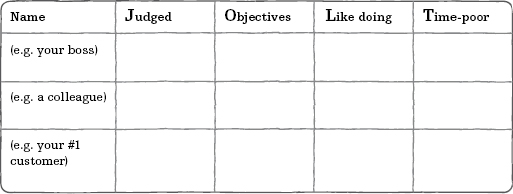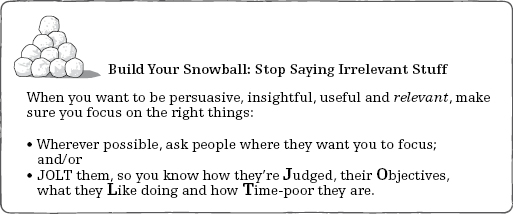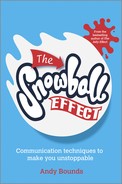63
When you want to stop saying irrelevant stuff
During the past few years, many people have tried to sell me things that I don’t want:
- Cars – I can’t drive.
- Bad debt insurance – our customers pay in advance.
- 3D glasses – I’m blind in one eye.
- Haircuts – I’m bald.
They all had persuasive messages. For somebody else. But the right message to the wrong person is the wrong message:
A company I know well has worked with some of the world’s leading brands for many years.
They recently pitched to help deliver a global, one-off, three-day event. Their key message was their uncanny ability to build long-lasting relationships.
They lost the pitch.
The reason? The customer said “our event only lasts three days. Your long-term relationships are irrelevant”.
Ouch.
Your Best Option: Ask
As I’ve mentioned elsewhere, the best way to tailor messages is – wherever possible – to ask people what they want you to talk about. This sounds obvious, but happens too rarely. How many times have you sat in Planning Meetings, debating “Should we cover topic X or Y?”, “Should we prepare material to leave behind? If so, what should we put in it?”
It’s interesting they’re called Planning Meetings. I think a better name is Guessing Meetings. So, instead of guessing – and probably being irrelevant – wherever possible, ask.
I have a teenage daughter, Megan. Consequently, I recently saw an interview with Zac Efron (apparently he used to star in something called High School Musical).
During the interview, the flirty interviewer asked “Zac, if you were to take me on a date, where would we go?” An interesting question to ask a millionaire movie star. He could’ve said anything – charter a private jet and fly wherever she wanted to go, invite her to the Oscars, get her the best seats at a sporting event . . .
But, he suggested none of these. Instead, he said:
“I don’t know. What do you like doing?”
“Dining out.”
“Well, in that case, I’d take you to your favourite restaurant.”
Very nicely done. One simple question, and he was able to suggest exactly what she wanted.
Another Great Option: Jolt
Sometimes, of course, questioning isn’t possible and/or doesn’t work. Maybe you’ve never met the person; or they’re too busy to see you. In this case, as well as doing your usual research, your best bet might be to JOLT them, where you use all the information you have about them to work out:
Once you know you’re talking to a target-driven, competitive, time-poor, golf-obsessed salesman, it’s much easier to tailor your messages accordingly. And, of course, if you can find areas of common interest, that’s great for rapport building.
So, JOLT helps you tailor messages quickly. It sounds perfect, yes? Well, no. I’ve had one piece of negative feedback about it: it sounds so easy, that people think it’s obvious. So they imagine – often wrongly – they can do it.
So, here’s a quick exercise: JOLT three people you should know well:

If you completed all the boxes quickly and accurately, then JOLT is something you’re naturally good at. If not, I guess you realized:
- It wasn’t as easy as you imagined.
- The O and the L are hardest (they’re more personal, so involve knowing someone well).
- It’s really important: you should know this stuff (when you next get to speak with them, ask).
Asking and JOLTing help you be more relevant and, therefore, persuasive. You might not succeed as quickly as Zac Efron did. But, you’ve a much greater chance of doing so if you find out what people are most interested in, then talk about that.

